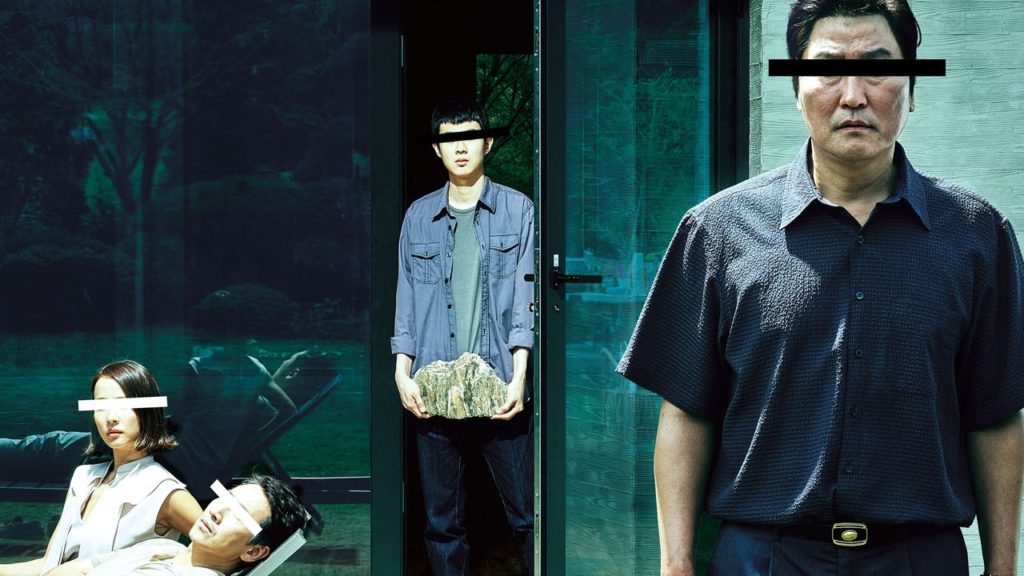By Pete Villasmil
Directed by Bong Joon-ho
Starring: Song Kang-ho, Lee Sun-kyun, Cho Yeo-jeong, Choi Woo-shik, and Park So-dam
It is common during award season for films that typically fly under the radar to receive mainstream attention. In the midst of all the hype, it’s understandable for some of these anticipated movies to disappoint. Bong Joon-ho’s Parasite is not one of these movies. Parasite subverts expectations, and does so in uncompromising fashion. It is a bold, symbolic exploration of economic disparity, pleasure, and influence while providing the most fascinating experience of the year.
Parasite’s plot is centered around the symbiotic dynamic between the wealthy Park family and the impoverished Kim family. The relationship becomes significantly more complicated as unexpected conflict arises. If the synopsis seems extremely vague, it is. There is an intentionality to it in the interest of preserving what the film has to offer. In spite of this, it should be noted that the movie isn’t afraid of shying away from deep symbolism. Parasite isn’t afraid of utilizing its plot elements or devices as dense metaphors that hold significant purpose. Simply put, it’s best to enter Parasite knowing as little as possible.
What can be said about that movie is that it features an immensely talented crew of actors and actresses. While Song Kang-Ho, who plays the patriarch of the Kim family, is a standout, the rest of the cast is able to deliver excellent performances as well. Even Parasite’s younger actors impress by standing toe-to-toe with their adult counterparts and being up to the task when the movie calls for it. In hindsight, some of Parasite’s most resonating moments result from these young performer’s talents. What’s great about the cast is how they are able to convey the tight-knit bond between the two diverse families. The characters are brought to life thanks to the wonderful chemistry they have with each other, contributing to Parasite’s broader themes of family loyalty.
Parasite also finds a way to play with the audience’s emotions in creative and unexpected ways. Surprisingly, the film is much funnier than most people would anticipate, especially considering its cynical subject matter. It would be best to describe Parasite as a dark comedy or a satire, but it’s difficult to place the movie into a specific category as the film finds a way to seamlessly transcend genres while remaining refreshingly original.
There are moments where you’ll be losing yourself in hysterical laughter, and others where you’re simply unsettled and shocked by what’s occurred on screen. These shifts may seem like a conflict of tone that would presumably damage the film’s pacing and consistency. To the contrary, Parasite is quite unpredictable in the best ways possible. It prevents the audience from foreseeing major elements of the plot and its many twists, leaving them in a state of deep suspense throughout its two-hour runtime. The sensation is captivating as an unsettling, unforeseen terror is waiting somewhere in the midst of this story; you just don’t know when or if it’s going to appear. Director Bong Joon-ho approaches this type of filmmaking in genius fashion and captures something few directors are ever able to pull off successfully.

Speaking of which, Bong Joon-ho does an admirable job in the director’s chair. His impressive versatility is quite apparent, as he creatively directs a combination of both comedic and suspenseful scenes. It’s this style that makes Parasite such a captivating and inventive film. Joon-ho’s skillful direction is only enhanced by his magnificent script, co-written by Han Jin-won. The scenarios in which both writers place these characters are imaginative and the riveting dialogue makes for a top-tier script.
The set design also deserves to be lauded. Considering Parasite takes place in approximately two locations: 1) a rundown apartment in the slums and 2) an extravagant multi-million-dollar house, the film finds a way to keep them unique and memorable. This is especially true as each venue changes throughout the course of the story in substantial ways, engaging the audience enough to avoid fatigue or boredom. These environments are integral to the story and are fleshed out beautifully. They are so well developed and filled with personality to the point that these places become characters themselves. It’s a wonderful effect that truly brings the world to life.
Parasite, like the creature it’s titled after, consumes you as you’re left pondering and reflecting on its themes and allegories. It is a compelling probe into the duality of the world’s socio-economic classes. What’s so astounding with Parasite is how universal its message, ideas, and themes are. Most viewers will never understand a single word of the Korean dialogue being said on screen, yet the film finds a way to leave you in complete awe. It’s a great example of the famous adage, “it’s not what you say, but how you say it,” and one of those rare circumstances where a movie stays with you days after the credits roll. Captivating and fearless, Parasite sets a new standard not just for foreign films, but for all of cinema.
Tremendous Trivia: * “Parasite” is the first Korean film to ever win the prestigious Palme d’Or prize at the 2019 Cannes Film Festival*

